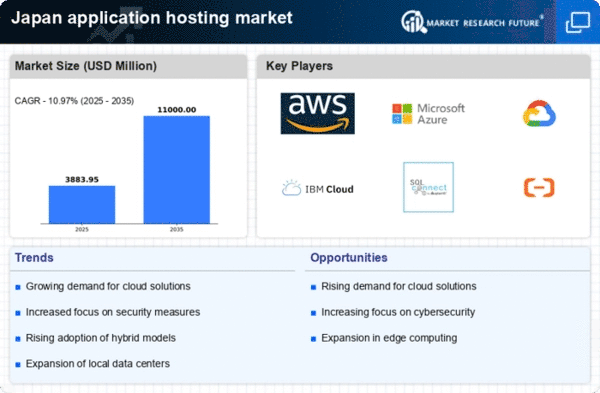Emergence of Edge Computing
The application hosting market in Japan is witnessing a transformative shift with the emergence of edge computing. This technology allows data processing to occur closer to the source, reducing latency and improving performance for applications. As IoT devices proliferate, the need for efficient data handling becomes critical. The application hosting market is responding to this trend by offering edge hosting solutions that cater to real-time data processing needs. It is estimated that the edge computing market in Japan will grow by 20% annually, creating new opportunities for application hosting providers. This shift not only enhances user experience but also supports the development of innovative applications that require immediate data access and processing.
Increased Focus on Data Localization
In Japan, the application hosting market is significantly influenced by the increasing emphasis on data localization. Regulatory frameworks are evolving, requiring businesses to store and process data within national borders. This trend is particularly relevant in sectors such as finance and healthcare, where compliance with local laws is critical. As a result, companies are investing in local data centers and application hosting services to ensure adherence to these regulations. The application hosting market is adapting to this demand, with a projected growth rate of 12% in localized hosting solutions by 2026. This focus on data sovereignty not only enhances security but also fosters trust among consumers, further driving the adoption of localized application hosting services.
Growing Importance of Managed Services
The application hosting market in Japan is increasingly characterized by the growing importance of managed services. Businesses are recognizing the value of outsourcing their hosting needs to specialized providers, allowing them to focus on core competencies. This trend is driven by the desire for cost efficiency and access to advanced technologies without the burden of managing infrastructure. The application hosting market is adapting to this demand, with managed hosting services projected to account for 30% of the total market by 2027. This shift enables organizations to leverage expert support and scalable solutions, ultimately enhancing their operational capabilities and responsiveness to market changes.
Rising Demand for Digital Transformation
The application hosting market in Japan is experiencing a notable surge in demand driven by the ongoing digital transformation across various sectors. Organizations are increasingly seeking to enhance operational efficiency and customer engagement through digital solutions. This shift is reflected in the growing investment in IT infrastructure, with a reported increase of 15% in IT spending in 2025. As businesses transition to digital platforms, the need for reliable and scalable application hosting services becomes paramount. This trend is likely to continue, as companies recognize the importance of agility and innovation in maintaining competitive advantage. The application hosting market is thus positioned to benefit from this transformation, as more enterprises opt for cloud-based solutions to support their digital initiatives.
Adoption of AI and Automation Technologies
The application hosting market in Japan is being significantly impacted by the adoption of artificial intelligence (AI) and automation technologies. These innovations are streamlining operations and enhancing service delivery within the hosting sector. Companies are increasingly utilizing AI-driven analytics to optimize resource allocation and improve performance monitoring. The application hosting market is likely to see a rise in AI-integrated hosting solutions, with a projected growth of 18% in AI applications by 2026. This trend not only improves efficiency but also enables providers to offer personalized services, thereby enhancing customer satisfaction and loyalty in a competitive landscape.
















